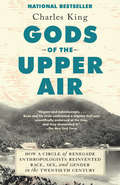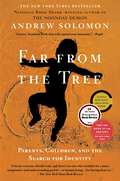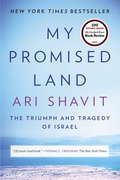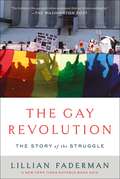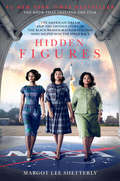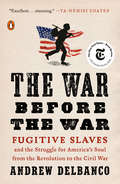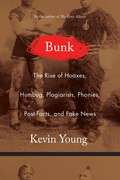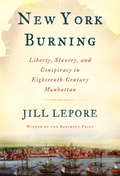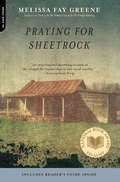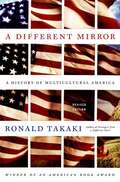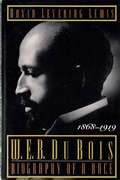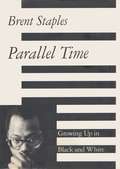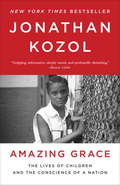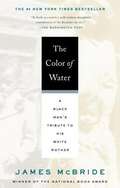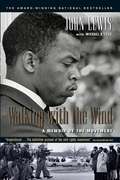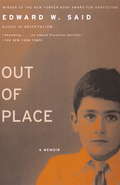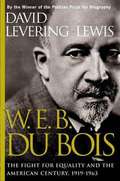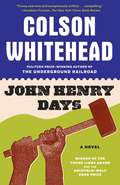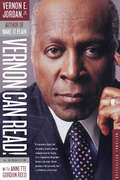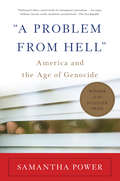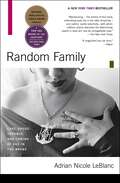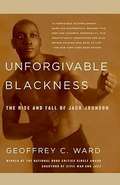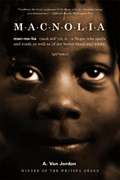Special Collections
Anisfield-Wolf Book Award
Description: The Anisfield-Wolf Book Award recognizes books that make important contributions to understanding racism and help develop an appreciation of the rich diversity of human cultures. #award
- Table View
- List View
Gods of the Upper Air
by Charles KingNEW YORK TIMES BESTSELLER2020 Anisfield-Wolf Book Award WinnerFinalist for the National Book Critics Circle AwardFrom an award-winning historian comes a dazzling history of the birth of cultural anthropology and the adventurous scientists who pioneered it—a sweeping chronicle of discovery and the fascinating origin story of our multicultural world.A century ago, everyone knew that people were fated by their race, sex, and nationality to be more or less intelligent, nurturing, or warlike. But Columbia University professor Franz Boas looked at the data and decided everyone was wrong. Racial categories, he insisted, were biological fictions. Cultures did not come in neat packages labeled "primitive" or "advanced." What counted as a family, a good meal, or even common sense was a product of history and circumstance, not of nature. In Gods of the Upper Air, a masterful narrative history of radical ideas and passionate lives, Charles King shows how these intuitions led to a fundamental reimagining of human diversity. Boas's students were some of the century's most colorful figures and unsung visionaries: Margaret Mead, the outspoken field researcher whose Coming of Age in Samoa is among the most widely read works of social science of all time; Ruth Benedict, the great love of Mead's life, whose research shaped post-Second World War Japan; Ella Deloria, the Dakota Sioux activist who preserved the traditions of Native Americans on the Great Plains; and Zora Neale Hurston, whose studies under Boas fed directly into her now classic novel, Their Eyes Were Watching God. Together, they mapped civilizations from the American South to the South Pacific and from Caribbean islands to Manhattan's city streets, and unearthed an essential fact buried by centuries of prejudice: that humanity is an undivided whole. Their revolutionary findings would go on to inspire the fluid conceptions of identity we know today. Rich in drama, conflict, friendship, and love, Gods of the Upper Air is a brilliant and groundbreaking history of American progress and the opening of the modern mind.
Far from the Tree
by Andrew SolomonFrom the National Book Award-winning author of The Noonday Demon: An Atlas of Depression comes a monumental new work, a decade in the writing, about family.
In Far from the Tree, Andrew Solomon tells the stories of parents who not only learn to deal with their exceptional children but also find profound meaning in doing so. Solomon's startling proposition is that diversity is what unites us all.
He writes about families coping with deafness, dwarfism, Down syndrome, autism, schizophrenia, multiple severe disabilities, with children who are prodigies, who are conceived in rape, who become criminals, who are transgender. While each of these characteristics is potentially isolating, the experience of difference within families is universal, as are the triumphs of love Solomon documents in every chapter. All parenting turns on a crucial question: to what extent parents should accept their children for who they are, and to what extent they should help them become their best selves.
Drawing on forty thousand pages of interview transcripts with more than three hundred families, Solomon mines the eloquence of ordinary people facing extreme challenges. Whether considering prenatal screening for genetic disorders, cochlear implants for the deaf, or gender reassignment surgery for transgender people, Solomon narrates a universal struggle toward compassion. Many families grow closer through caring for a challenging child; most discover supportive communities of others similarly affected; some are inspired to become advocates and activists, celebrating the very conditions they once feared.
Woven into their courageous and affirming stories is Solomon's journey to accepting his own identity, which culminated in his midlife decision, influenced by this research, to become a parent. Elegantly reported by a spectacularly original thinker, Far from the Tree explores themes of generosity, acceptance, and tolerance--all rooted in the insight that love can transcend every prejudice.
This crucial and revelatory book expands our definition of what it is to be human.
My Promised Land
by Ari ShavitWINNER OF THE NATAN BOOK AWARD.
An authoritative and deeply personal narrative history of the State of Israel, by one of the most influential journalists writing about the Middle East today.
Not since Thomas L. Friedman's groundbreaking From Beirut to Jerusalem has a book captured the essence and the beating heart of the Middle East as keenly and dynamically as My Promised Land. Facing unprecedented internal and external pressures, Israel today is at a moment of existential crisis.
Ari Shavit draws on interviews, historical documents, private diaries, and letters, as well as his own family's story, illuminating the pivotal moments of the Zionist century to tell a riveting narrative that is larger than the sum of its parts: both personal and national, both deeply human and of profound historical dimension.
We meet Shavit's great-grandfather, a British Zionist who in 1897 visited the Holy Land on a Thomas Cook tour and understood that it was the way of the future for his people; the idealist young farmer who bought land from his Arab neighbor in the 1920s to grow the Jaffa oranges that would create Palestine's booming economy; the visionary youth group leader who, in the 1940s, transformed Masada from the neglected ruins of an extremist sect into a powerful symbol for Zionism; the Palestinian who as a young man in 1948 was driven with his family from his home during the expulsion from Lydda; the immigrant orphans of Europe's Holocaust, who took on menial work and focused on raising their children to become the leaders of the new state; the pragmatic engineer who was instrumental in developing Israel's nuclear program in the 1960s, in the only interview he ever gave; the zealous religious Zionists who started the settler movement in the 1970s; the dot-com entrepreneurs and young men and women behind Tel-Aviv's booming club scene; and today's architects of Israel's foreign policy with Iran, whose nuclear threat looms ominously over the tiny country.
As it examines the complexities and contradictions of the Israeli condition, My Promised Land asks difficult but important questions: Why did Israel come to be? How did it come to be? Can Israel survive? Culminating with an analysis of the issues and threats that Israel is currently facing, My Promised Land uses the defining events of the past to shed new light on the present. The result is a landmark portrait of a small, vibrant country living on the edge, whose identity and presence play a crucial role in today's global political landscape.
A Tale of Two Plantations
by Richard S. DunnRichard Dunn reconstructs the lives of three generations of slaves on a sugar estate in Jamaica and a plantation in Virginia, to understand the starkly different forms slavery took. Deadly work regimens and rampant disease among Jamaican slaves contrast with population expansion in Virginia leading to the selling of slaves and breakup of families.
The Gay Revolution
by Lillian FadermanThe sweeping story of the modern struggle for gay, lesbian, and trans rights--from the 1950s to the present--based on amazing interviews with politicians, military figures, legal activists, and members of the entire LGBT community who face these challenges every day.
The fight for gay, lesbian, and trans civil rights--the years of outrageous injustice, the early battles, the heart-breaking defeats, and the victories beyond the dreams of the gay rights pioneers--is the most important civil rights issue of the present day. Based on rigorous research and more than 150 interviews, The Gay Revolution tells this unfinished story not through dry facts but through dramatic accounts of passionate struggles, with all the sweep, depth, and intricacies only an award-winning activist, scholar, and novelist like Lillian Faderman can evoke.
The Gay Revolution begins in the 1950s, when law classified gays and lesbians as criminals, the psychiatric profession saw them as mentally ill, the churches saw them as sinners, and society victimized them with irrational hatred. Against this dark backdrop, a few brave people began to fight back, paving the way for the revolutionary changes of the 1960s and beyond. Faderman discusses the protests in the 1960s; the counter reaction of the 1970s and early eighties; the decimated but united community during the AIDS epidemic; and the current hurdles for the right to marriage equality.
In the words of the eyewitnesses who were there through the most critical events, The Gay Revolution paints a nuanced portrait of the LGBT civil rights movement. A defining account, this is the most complete and authoritative book of its kind.
Hidden Figures
by Margot Lee ShetterlyThe phenomenal true story of the black female mathematicians at NASA whose calculations helped fuel some of America's greatest achievements in space. Soon to be a major motion picture starring Taraji P. Henson, Octavia Spencer, Janelle Monae, Kirsten Dunst, and Kevin Costner.
Before John Glenn orbited the earth, or Neil Armstrong walked on the moon, a group of dedicated female mathematicians known as "human computers" used pencils, slide rules and adding machines to calculate the numbers that would launch rockets, and astronauts, into space. Among these problem-solvers were a group of exceptionally talented African American women, some of the brightest minds of their generation.
Originally relegated to teaching math in the South's segregated public schools, they were called into service during the labor shortages of World War II, when America's aeronautics industry was in dire need of anyone who had the right stuff. Suddenly, these overlooked math whizzes had a shot at jobs worthy of their skills, and they answered Uncle Sam's call, moving to Hampton, Virginia and the fascinating, high-energy world of the Langley Memorial Aeronautical Laboratory.
Even as Virginia's Jim Crow laws required them to be segregated from their white counterparts, the women of Langley's all-black "West Computing" group helped America achieve one of the things it desired most: a decisive victory over the Soviet Union in the Cold War, and complete domination of the heavens.
Starting in World War II and moving through to the Cold War, the Civil Rights Movement and the Space Race, Hidden Figures follows the interwoven accounts of Dorothy Vaughan, Mary Jackson, Katherine Johnson and Christine Darden, four African American women who participated in some of NASA's greatest successes. It chronicles their careers over nearly three decades they faced challenges, forged alliances and used their intellect to change their own lives, and their country's future.
The War Before the War
by Andrew DelbancoThe devastating story of how fugitive slaves drove the nation to Civil War
For decades after its founding, America was really two nations--one slave, one free. There were many reasons why this composite nation ultimately broke apart, but the fact that enslaved black people repeatedly risked their lives to flee their masters in the South in search of freedom in the North proved that the "united" states was actually a lie.
Fugitive slaves exposed the contradiction between the myth that slavery was a benign institution and the reality that a nation based on the principle of human equality was in fact a prison-house in which millions of Americans had no rights at all. By awakening northerners to the true nature of slavery, and by enraging southerners who demanded the return of their human "property," fugitive slaves forced the nation to confront the truth about itself.
By 1850, with America on the verge of collapse, Congress reached what it hoped was a solution-- the notorious Compromise of 1850, which required that fugitive slaves be returned to their masters. Like so many political compromises before and since, it was a deal by which white Americans tried to advance their interests at the expense of black Americans.
Yet the Fugitive Slave Act, intended to preserve the Union, in fact set the nation on the path to civil war. It divided not only the American nation, but also the hearts and minds of Americans who struggled with the timeless problem of when to submit to an unjust law and when to resist. The fugitive slave story illuminates what brought us to war with ourselves and the terrible legacies of slavery that are with us still.
Bunk
by Kevin YoungYoung finds that faker is woven from stereotype and suspicion, race being the most insidious American hoax of all.
New York Burning
by Jill LeporeOver a frigid few weeks in the winter of 1741, ten fires blazed across Manhattan. With each new fire, panicked whites saw more evidence of a slave uprising. In the end, thirteen black men were burned at the stake, seventeen were hanged and more than one hundred black men and women were thrown into a dungeon beneath City Hall.
In New York Burning, Bancroft Prize-winning historian Jill Lepore recounts these dramatic events, re-creating, with path-breaking research, the nascent New York of the seventeenth century. Even then, the city was a rich mosaic of cultures, communities and colors, with slaves making up a full one-fifth of the population. Exploring the political and social climate of the times, Lepore dramatically shows how, in a city rife with state intrigue and terror, the threat of black rebellion united the white political pluralities in a frenzy of racial fear and violence.
Praying For Sheetrock
by Melissa Fay GreeneFinalist for the 1991 National Book Award and a New York Times Notable book, Praying for Sheetrock is the story of McIntosh County, a small, isolated, and lovely place on the flowery coast of Georgia--and a county where, in the 1970s, the white sheriff still wielded all the power, controlling everything and everybody. Somehow the sweeping changes of the civil rights movement managed to bypass McIntosh entirely. It took one uneducated, unemployed black man, Thurnell Alston, to challenge the sheriff and his courthouse gang--and to change the way of life in this community forever.
A Different Mirror
by Ronald TakakiTakaki (emeritus, ethnic studies, U. of California-Berkeley) takes the perspective of ethnic, racial, and national minorities to recount the history of the US since the founding of the first English colony in 1607. The first edition won an American Book Award in 1993. This second incorporates new passages on Franklin Roosevelt's response to the Holocaust, the influx of Southeast Asian immigrants after the Vietnam War, and people pushed northward by poverty in Mexico.
W. E. B. Du Bois
by David Levering LewisA definitive biography of the African-American author and scholar describes Du Bois's formative years, the evolution of his philosophy, and his roles as a founder of the NAACP and architect of the American civil rights movement.
Pulitzer Prize Winner
Parallel Time
by Brent StaplesParallel Time is an evocative memoir that poses universal questions: Where does the family end and the self begin? What do we owe our families, and what do we owe our dreams for ourselves? What part of the past is a gift and what part a shackle?
For Brent Staples there is the added dimension of race: moving from a black world into one largely defined by whites.
The oldest song among nine children, Brent grew up in a small industrial town near Philadelphia.
First a scholarship to a local college and then one for graduate study at the University of Chicago pulled him out of the close family circle.
While he was away, the industries that supported the town failed, and drug dealing rushed in to fill the economic void.
News of arrests and premature deaths among Brent's childhood friends underscored the precariousness of his perch in a world of mostly white achievers. A younger brother became a cocaine dealer and was murdered by one of his "clients."
His death propelled Brent into a reconsideration of his childhood and coming-of-age that offers vivid portraits of family and place, of values that supported and pressures that tore apart, of the appeal and pain of entering a predominantly white world, and of the strengths and vulnerabilities of the black world he grew away from.
Amazing Grace
by Jonathan KozolThe author of Savage Inequalities, a New York Times best-seller, and Rachel and Her Children, winner of the Robert F. Kennedy Book Award, tells the stories of a handful of children who have--through the love and support of their families and dedicated community leaders--not yet lost their battle with the perils of life in America's most hopeless, helpless, and dangerous neighborhoods.
The Color of Water
by James McbrideWho is Ruth McBride Jordan? A self-declared "light-skinned" woman evasive about her ethnicity, yet steadfast in her love for her twelve black children.
James McBride, journalist, musician, and son, explores his mother's past, as well as his own upbringing and heritage, in a poignant and powerful debut,The Color Of Water: A Black Man's Tribute to His White Mother.
The son of a black minister and a woman who would not admit she was white, James McBride grew up in "orchestrated chaos" with his eleven siblings in the poor, all-black projects of Red Hook, Brooklyn.
"Mommy," a fiercely protective woman with "dark eyes full of pep and fire," herded her brood to Manhattan's free cultural events, sent them off on buses to the best (and mainly Jewish) schools, demanded good grades, and commanded respect.
As a young man, McBride saw his mother as a source of embarrassment, worry, and confusion-and reached thirty before he began to discover the truth about her early life and long-buried pain.
In The Color of Water, McBride retraces his mother's footsteps and, through her searing and spirited voice, recreates her remarkable story. The daughter of a failed itinerant Orthodox rabbi, she was born Rachel Shilsky (actually Ruchel Dwara Zylska) in Poland on April 1, 1921.
Fleeing pogroms, her family emigrated to America and ultimately settled in Suffolk, Virginia, a small town where anti-Semitism and racial tensions ran high.
With candor and immediacy, Ruth describes her parents' loveless marriage; her fragile, handicapped mother; her cruel, sexually-abusive father; and the rest of the family and life she abandoned.
At seventeen, after fleeing Virginia and settling in New York City, Ruth married a black minister and founded the all- black New Brown Memorial Baptist Church in her Red Hook living room. "God is the color of water," Ruth McBride taught her children, firmly convinced that life's blessings and life's values transcend race.
Twice widowed, and continually confronting overwhelming adversity and racism, Ruth's determination, drive and discipline saw her dozen children through college-and most through graduate school.
At age 65, she herself received a degree in social work from Temple University.
Interspersed throughout his mother's compelling narrative, McBride shares candid recollections of his own experiences as a mixed-race child of poverty, his flirtations with drugs and violence, and his eventual self- realization and professional success.
The Color of Water touches readers of all colors as a vivid portrait of growing up, a haunting meditation on race and identity, and a lyrical valentine to a mother from her son.
Walking with the Wind
by John Lewis and Michael D'OrsoAn eloquent, epic first-hand account of the civil rights movement by a man who lived it-- an American hero whose courage, vision, and dedication helped change history.
Out of Place
by Edward W. SaidWINNER OF THE NEW YORKER BOOK AWARD FOR NONFICTION • From one of the most important intellectuals of our time comes an extraordinary story of exile and a celebration of an irrecoverable past. A fatal medical diagnosis in 1991 convinced Edward Said that he should leave a record of where he was born and spent his childhood, and so with this memoir he rediscovers the lost Arab world of his early years in Palestine, Lebanon, and Egypt."Engrossing. . . . [Said has] an almost Proustian feel for smells, sounds, sights, and telling anecdotes." --The New York Review of Books Said writes with great passion and wit about his family and his friends from his birthplace in Jerusalem, schools in Cairo, and summers in the mountains above Beirut, to boarding school and college in the United States, revealing an unimaginable world of rich, colorful characters and exotic eastern landscapes. Underscoring all is the confusion of identity the young Said experienced as he came to terms with the dissonance of being an American citizen, a Christian and a Palestinian, and, ultimately, an outsider. Richly detailed, moving, often profound, Out of Place depicts a young man's coming of age and the genesis of a great modern thinker.
W.E.B. Du Bois
by David Levering LewisThe second volume of the Pulitzer Prize--winning biography that The Washington Post hailed as "an engrossing masterpiece"
Charismatic, singularly determined, and controversial, W.E.B. Du Bois was a historian, novelist, editor, sociologist, founder of the NAACP, advocate of women's rights, and the premier architect of the Civil Rights movement. His hypnotic voice thunders out of David Levering Lewis's monumental biography like a locomotive under full steam.
This second volume of what is already a classic work begins with the triumphal return from WWI of African American veterans to the shattering reality of racism and lynching even as America discovers the New Negro of literature and art. In stunning detail, Lewis chronicles the little-known political agenda behind the Harlem Renaissance and Du Bois's relentless fight for equality and justice, including his steadfast refusal to allow whites to interpret the aspirations of black America. Seared by the rejection of terrified liberals and the black bourgeoisie during the Communist witch-hunts, Du Bois ended his days in uncompromising exile in newly independent Ghana. In re-creating the turbulent times in which he lived and fought, Lewis restores the inspiring and famed Du Bois to his central place in American history.
Pulitzer Prize Winner
John Henry Days
by Colson WhiteheadColson Whitehead’s eagerly awaited and triumphantly acclaimed new novel is on one level a multifaceted retelling of the story of John Henry, the black steel-driver who died outracing a machine designed to replace him.
On another level it’s the story of a disaffected, middle-aged black journalist on a mission to set a record for junketeering who attends the annual John Henry Days festival.
It is also a high-velocity thrill ride through the tunnel where American legend gives way to American pop culture, replete with p. r. flacks, stamp collectors, blues men , and turn-of-the-century song pluggers.
John Henry Days is an acrobatic, intellectually dazzling, and laugh-out-loud funny book that will be read and talked about for years to come.
Vernon Can Read!
by Annette Gordon-Reed and Vernon JordanAs a young college student in Atlanta, Vernon E. Jordan, Jr. had a summer job driving a white banker around town. During the man's post-luncheon siestas, Jordan passed the time reading books, a fact that astounded his boss. "Vernon can read!" the man exclaimed to his relatives. Nearly fifty years later, Vernon Jordan, now a senior executive at Lazard Freres, long-time civil rights leader, adviser and close friend to presidents and business leaders and one of the most charismatic figures in America, has written an unforgettable book about his life and times. The story of Vernon Jordan's life encompasses the sweeping struggles, changes, and dangers of African-American life in the civil rights revolution of the second half of the twentieth century.
A Problem From Hell
by Samantha PowerIn 1993, as a 23-year-old correspondent covering the wars in the Balkans, I was initially comforted by the roar of NATO planes flying overhead.
President Clinton and other western leaders had sent the planes to monitor the Bosnian war, which had killed almost 200,000 civilians. But it soon became clear that NATO was unwilling to target those engaged in brutal "ethnic cleansing. " American statesmen described Bosnia as "a problem from hell," and for three and a half years refused to invest the diplomatic and military capital needed to stop the murder of innocents.
In Rwanda, around the same time, some 800,000 Tutsi and opposition Hutu were exterminated in the swiftest killing spree of the twentieth century. Again, the United States failed to intervene. This time U. S. policy-makers avoided labeling events "genocide" and spearheaded the withdrawal of UN peacekeepers stationed in Rwanda who might have stopped the massacres underway.
Whatever America's commitment to Holocaust remembrance (embodied in the presence of the Holocaust Museum on the Mall in Washington, D. C. ), the United States has never intervened to stop genocide. This book is an effort to understand why.
While the history of America's response to genocide is not an uplifting one, "A Problem from Hell" tells the stories of countless Americans who took seriously the slogan of "never again" and tried to secure American intervention. Only by understanding the reasons for their small successes and colossal failures can we understand what we as a country, and we as citizens, could have done to stop the most savage crimes of the last century. -Samantha
Pulitzer Prize Winner
Random Family
by Adrian Nicole LeblancRandom Family tells the American outlaw saga lurking behind the headlines of gangsta glamour, gold-drenched drug dealers, and street-corner society.
With an immediacy made possible only after ten years of reporting, Adrian Nicole LeBlanc immerses the reader in the mind-boggling intricacies of the little-known ghetto world. She charts the tumultuous cycle of the generations, as girls become mothers, mothers become grandmothers, boys become criminals, and hope struggles against deprivation.
Two romances thread through Random Family: the sexually charismatic nineteen-year-old Jessica's dizzying infatuation with a hugely successful young heroin dealer, Boy George, and fourteen-year-old Coco's first love with Jessica's little brother, Cesar, an aspiring thug.
Fleeing from family problems, the young couples try to outrun their destinies. Chauffeurs whisk them to getaways in the Poconos and to nightclubs. They cruise the streets in Lamborghinis and customized James Bond cars.
Jessica and Boy George ride the wild adventure between riches and ruin, while Coco and Cesar stick closer to the street, all four caught in a precarious dance between life and death.
Friends get murdered; the DEA and FBI investigate Boy George's business activities; Cesar becomes a fugitive; Jessica and Coco endure homelessness, betrayal, the heartbreaking separation of prison, and throughout it all, the insidious damage of poverty.
Together, then apart, the teenagers make family where they find it. Girls look for excitement and find trouble; boys, searching for adventure, join crews and prison gangs. Coco moves upstate to dodge the hazards of the Bronx; Jessica seeks solace in romance. Both find that love is the only place to go.
A gifted prose stylist and a profoundly compassionate observer, Adrian Nicole LeBlanc has slipped behind the cold statistics and sensationalism surrounding inner-city life and come back with a riveting, haunting, and true urban soap opera that reveals the clenched grip of the streets.
Random Family is a compulsive read and an important journalistic achievement, sure to take its place beside the classics of the genre.
Generations of Captivity
by Ira BerlinIra Berlin traces the history of African-American slavery in the United States from its beginnings in the seventeenth century to its fiery demise nearly three hundred years later.
Most Americans, black and white, have a singular vision of slavery, one fixed in the mid-nineteenth century when most American slaves grew cotton, resided in the deep South, and subscribed to Christianity. Here, however, Berlin offers a dynamic vision, a major reinterpretation in which slaves and their owners continually renegotiated the terms of captivity. Slavery was thus made and remade by successive generations of Africans and African Americans who lived through settlement and adaptation, plantation life, economic transformations, revolution, forced migration, war, and ultimately, emancipation.
Berlin's understanding of the processes that continually transformed the lives of slaves makes Generations of Captivity essential reading for anyone interested in the evolution of antebellum America. Connecting the "Charter Generation" to the development of Atlantic society in the seventeenth century, the "Plantation Generation" to the reconstruction of colonial society in the eighteenth century, the "Revolutionary Generation" to the Age of Revolutions, and the "Migration Generation" to American expansionism in the nineteenth century, Berlin integrates the history of slavery into the larger story of American life. He demonstrates how enslaved black people, by adapting to changing circumstances, prepared for the moment when they could seize liberty and declare themselves the "Freedom Generation."
This epic story, told by a master historian, provides a rich understanding of the experience of African-American slaves, an experience that continues to mobilize American thought and passions today.
Unforgivable Blackness
by Geoffrey C. WardIn this vivid biography Geoffrey C. Ward brings back to life the most celebrated — and the most reviled — African American of his age. Jack Johnson battled his way out of obscurity and poverty in the Jim Crow South to win the title of heavyweight champion of the world. At a time when whites ran everything in America, he took orders from no one and resolved to live as if color did not exist. While most blacks struggled simply to exist, he reveled in his riches and his fame, sleeping with whomever he pleased, to the consternation and anger of much of white America. Because he did so the federal government set out to destroy him, and he was forced to endure prison and seven years of exile. This definitive biography portrays Jack Johnson as he really was--a battler against the bigotry of his era and the embodiment of American individualism.
Macnolia
by A. Van JordanIn 1936, teenager MacNolia Cox became the first African American finalist in the National Spelling Bee Competition. Supposedly prevented from winning, the precocious child who dreamed of becoming a doctor was changed irrevocably. Her story, told in a poignant nonlinear narrative, illustrates the power of a pivotal moment in a life.
